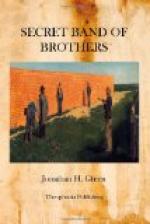Dr. Johnson says that the gambler is no better than a robber, because he acquires property without an equivalent. The whole gist of the argument lies here. You strip a man of fortune, or tear from his hands the earnings of a long life, and give him in return—nothing! Mr. Freeman says, in answer to this—yes, you give him the chance of robbing you! And he goes so far in his sophistry, as to contend that if a man attempts to rob you on the highway, you have a right to rob him! Such is the language of the gambler, on the rule of right, who wanting a principle of virtue, resorts to every extravagant theory, to justify his violations of the first law of nature.
Justice is the foundation of all human institutions: and this ordains, that no man shall take from another, what is his own, without paying him an equivalent. The gambler pays no equivalent—and hence, he stands on the same platform with the robber.
The strong point in the logic of Mr. Freeman was, that other professions also acquire property without paying an equivalent, and therefore gamblers were not criminal! We marvelled that a man of his sagacity should venture on so gross a sophism. He alluded to speculators and stock-jobbers, who gained their thousands without an exchange of values, and exulted that the gambler was no worse. But could this make the gambler an honest man, because other men were rogues? How desperate the cause that could clutch at so frail a straw for support! Yet Mr. Freeman appeared perfectly unconscious of the imbecility of his reasoning. More perfect hallucination we never beheld!
Every man feels, when he gains property without an equivalent, that he has done a wrong. Every dollar so acquired plants a fang in his heart. Conscience goads him. He is miserable, restless, tortured, and for temporary relief flies to the transient oblivion of the bowl. When he wins, he drinks—and when he loses, he drinks to desperation. He feels that when he wins, he is a rogue—and that when he loses, he is a victim—no matter whether gambler, speculator or stock-jobber—he has violated the rule of right, by acquiring property without an equivalent; and he feels the degradation of the robber, who cries “stand!” to the passenger on the highway, and extorts his purse, with the pistol at his breast.
Of the fascinating charms of gambling, history has left us too many records to make us insensible of the importance of the safe-guards which society ought to erect, to defend itself from the poison of so infectious a contamination. Who would believe, that the great Wilberforce was once a gambler! That even Pitt once stood on the brink of a gambler’s hell. But Wilberforce was cured by winning L2000 at Holland-house—and such was the pain he felt for those who had lost their money, that it prevented all “his future triumphs in the infernal regions.” But in those regions, flourished the greatest statesmen and wits




